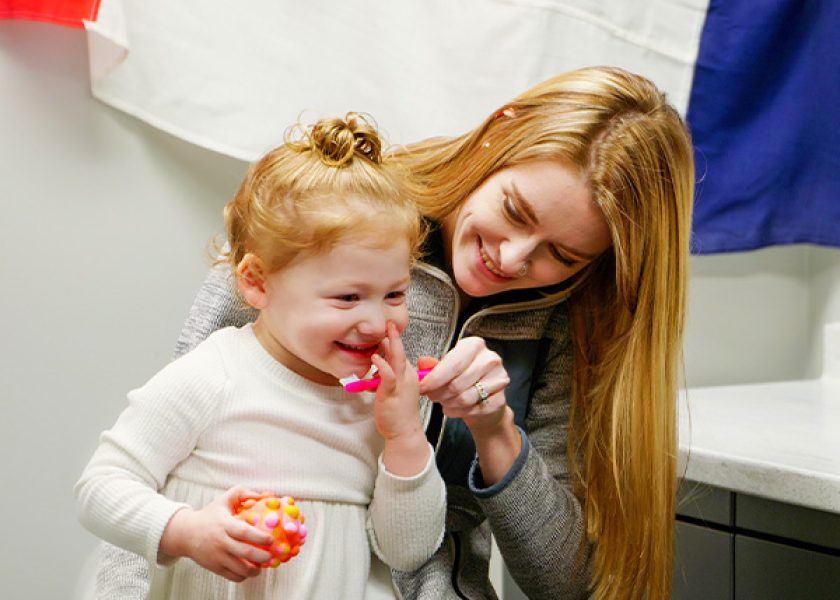Tips to Help Kids With Special Needs Brush & Floss


Taking care of children’s teeth is never one-size-fits-all. For families with children who have a developmental disability, autism spectrum disorder, sensory processing disorder, physical disability, or complex medical condition, dental care can feel especially overwhelming. But with a few simple strategies from our Saginaw pediatric dentist, brushing and flossing at home can become more manageable—and even a positive part of the day.
As a pediatric dental office experienced in special needs dentistry for kids, we understand that every child is different. Our team is committed to making dental care for special needs children feel possible, supportive, and personalized.
Here are 5 tips for making sure your child’s smile stays squeaky clean outside of our office.
1. Build a Routine That Works for Your Child
Children with special needs often thrive with predictability. Creating a consistent oral hygiene routine can reduce anxiety and increase cooperation. If they know what to expect every day, they may be more enthusiastic about completing the task and not scared off by an activity that doesn’t feel like it gels with the order of the day. Think about what your child prefers and use that as a guide for how to approach pediatric dental care.
Our pediatric dentist recommends trying:
- Brushing and flossing at the same time each day, using a visual schedule or picture chart
- Playing a favorite calming song during brushing to signal “tooth time”
- Offering gentle reminders or countdowns so transitions don’t feel abrupt
2. Adapt Tools for Comfort & Success
The tools you use for brushing and flossing can make a big difference in how comfortable and successful your child feels during oral care. For many children with special needs, sensory sensitivities or physical limitations can turn an everyday toothbrush into a real challenge. Choosing the right products can ease those struggles.
Electric toothbrushes are often a great option. Some children find the gentle vibration soothing, and it can help ensure a more thorough teeth cleaning with less effort. For kids who struggle with gripping or fine motor skills, toothbrushes with larger, easy-to-hold handles or rubber grips offer better control. If traditional floss is hard to manage—for either your child or you—floss holders or pre-threaded floss picks can make the special needs dental care process simpler and less frustrating.
For children with strong reactions to certain tastes or textures, try an unflavored toothpaste or one with a mild taste. Smaller toothbrush heads can also help reduce discomfort, especially if your child has a sensitive gag reflex. Making even small adjustments based on your child’s preferences can ease resistance and create a more positive daily routine.
3. Use Visual & Social Supports
Visual schedules, modeling, and social stories are all great when it comes to teaching a child about toothbrushing and flossing. Showing them what you’re going to do before you do it takes away the mystery or surprise element and gives them time to prepare. Options you can try include:
- Demonstrating on a doll or stuffed animal
- Brushing your own teeth side-by-side with your child
- Reading a picture book or watching a short video about brushing
Our special needs pediatric dentist recommends using visual support as it gives your child a sense of structure, helping them know what’s happening and what’s coming next. Again, predictability is key here and can make a world of difference.
4. Focus on Progress, Not Perfection
Some days brushing might go smoothly. Other days, just getting toothpaste near the mouth feels like a win. That’s okay. Celebrate small successes, and give lots of praise when your child participates. You’ll get there in time and rushing or impatience will not help. We suggest:
- Letting your child take breaks if needed
- Allowing them to brush a bit on their own, then finish the job gently
- Using a timer to make brushing feel like a game
Brushing even a few teeth is better than none. Over time, your child will learn and adapt with your support. Remember, the goal is always comfort, ease, and steady progress—not perfection.
5. Lean on Your Special Needs Pediatric Dentist
At our practice, special needs dental care means more than dental procedures—it’s about building trust, offering flexibility, and providing care that respects each child’s needs. Whether your child is due for professional teeth cleaning, needs a pediatric dental crown, or requires emergency pediatric dental care, we’re here with guidance, patience, and understanding.
We also offer:
- Preventive dental care to help avoid future problems
- Stainless steel dental crowns for restoring damaged baby teeth safely and effectively
- Personalized advice on home routines, diet, and behavior techniques
Special care dentistry for kids doesn’t mean settling for less. It means adapting care to fit your child’s unique strengths, sensitivities, and health needs. If you have questions or need to schedule a visit with our pediatric dentist, please reach out! We’re here to provide the compassionate, expert support your child deserves.
We’re Here to Support You
Parenting a child with special needs comes with challenges—and you don’t have to figure out oral care alone. Whether you’re looking for tips on dental care for kids with autism, guidance on brushing routines, or help navigating complex medical needs, our pediatric dentist in Saginaw, MI, is ready to support you every step of the way. Call Great Lakes Bay Pediatric Dentistry today at (989) 792-9201 to request an appointment.



